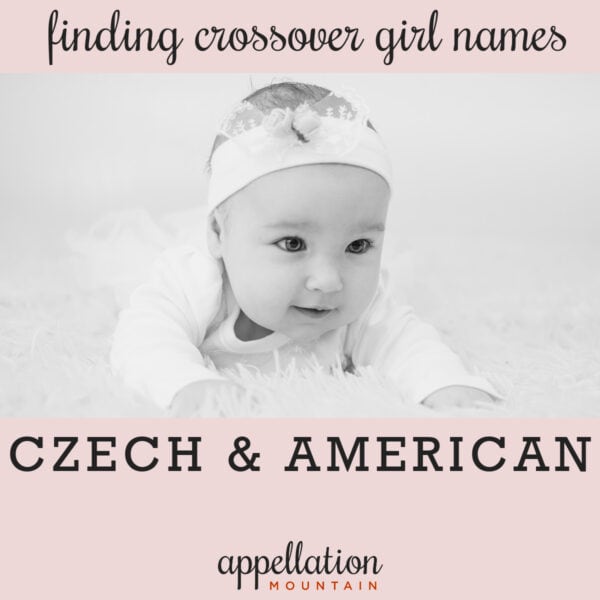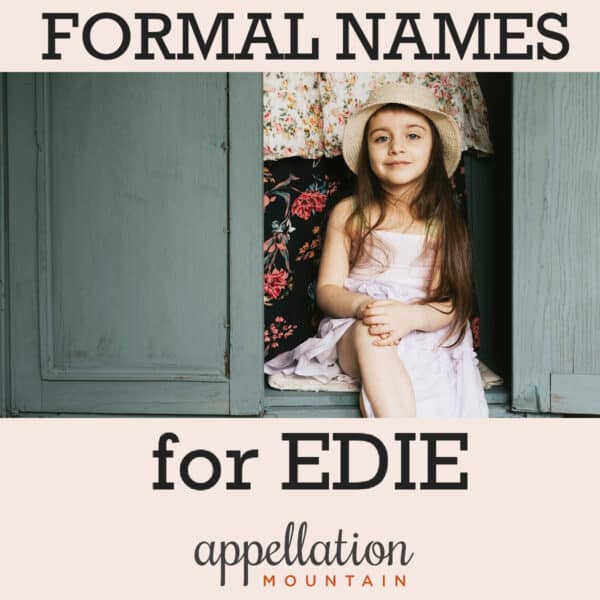In honor of my 37th birthday, our Baby Name of the Day is the one I shed: Amy.
Amy was the Zoe of the 1970s: brief, complete and not new, but enjoying her most popular moment.
She has an irresistible meaning, too – from the Latin amata, beloved. The name appears in Medieval France in feminine (Amée) and masculine (Amé) forms. In Norman England, you might have heard Amice, Amiot or even Amata. Surname Ames is related to this cluster.
In any form, Amy was quite rare after the fourteenth century, but a slow revival began in the 1800s. Louisa May Alcott’s Little Women were named Meg, Jo, Beth, and Amy. Originally published in 1868/1869, the book remains beloved and doubtless influenced some parents.
It’s tempting to credit Amy’s revival to two film adaptations – 1933’s version with Joan Bennet playing Amy (and Katharine Hepburn as Jo) and the 1949 movie, featuring Elizabeth Taylor as Amy.
But that doesn’t quite track with the stats. Historical figures predate Amy’s spike in popularity, too – English aviatrix Amy Johnson made solo flights in the 1930s. Poet Amy Lowell won a Pulitzer Prize in 1926. Canadian-born Aimee Semple-McPherson was a celebrity in the 1920s when she founded the International Church of the Foursqaure Gospel.
In 1947, Amy ranked #331. Just two years later, in 1949, she leapt to #231. Amy entered the Top 100 in 1958, the Top Ten in 1969 and peaked at #2 from 1973 to 1976. Top 100 til 1998, #130 in 2009
What fueled Amy’s rapid rise in the 1940s?
Blame it on Broadway.
Brandon Thomas’ play Charley’s Aunt debuted in London in 1892. It was a record-breaking smash hit. The two female characters were called Kitty and Amy.
Set at Oxford, just days before the class of 1892 gradates, Charley and Jack are roommates anticipating a visit from their girlfriends. Charley’s aunt is also expected – and required, as no respectable girl of the day would be without a chaperone.
The girls arrive, but there’s confusion regarding the required aunt – and, because Jack intends to propose to Kitty, Charley ends up masquerading as his aged aunt to keep the girls from exiting stage left. Hilarity ensues, and disaster threatens, but all ends well.
The stage play was reborn as a musical called Where’s Charley? in 1948, including a song called “Once in Love with Amy.”
That song explains Amy’s 100-spot leap in one year.
Ray Bolger, best known as the Scarecrow in The Wizard of Oz, originated the role of Charley on Broadway, winning a Tony Award in 1949. He stayed on as Charlie in the 1952 film adaptation and performed the song often.
Music continued to send the name up the charts:
- In the 1960s, Amy Records released singles recorded by artists like Del Shannon and Lee Dorsey;
- Francis Ford Coppola’s 1966 movie You’re a Big Boy Now included a character called Amy, and an instrumental piece by hit-makers The Lovin’ Spoonful called “Amy’s Theme;”
- In 1975, country rockers Pure Prairie League scored a hit with “Amie.”
From first daughter Amy Carter to writer Amy Tan, countless notable Amys were born in the late 1960s and 1970s, including:
- Actresses Amy Irving and Amy Adams;
- Singers from Amy Grant to Amy Winehouse;
- Comediennes Amy Sedaris and Amy Poehler.
Amy ranked #130 in 2009, and is slowly fading. The français Aimee held on at #891. while Amie and Ami are all but forgotten.
Today, Amy is more likely to be a nickname for Amelia than an independent name. But between her literary roots and musical associations, chances are that when all of those Amys are grandmothers, their given name will sound fresh once again.




Happy birthday!
You know, I’ve always felt that Amy’s name was the odd one out in Little Women. Margaret, Josephine, and Elizabeth have such a different feel than Amy does. Amy is one of those names that one is surprised to learn is a classic.
And I agree completely with what Kelly said — Amy would be positively lovely if it hadn’t become so popular. I just wish all the parents today naming their daughters Emma and Olivia would realize this.
Happy birthday! and also, @Emmy Jo – just because I saw she commented and was surprised… she left everyone hanging on her blog about a year ago! I adored all her names and was actually yesterday wondering what name she had picked finally! If you see this, Emmy Jo, do tell!
Tricia — Sorry I haven’t updated my blog in so long. I REALLY need to do that. Maybe tonight after baby goes to bed…
Thanks for being curious what we named him. We ended up deciding on Julius Arthur. And we actually have quite a naming story. It took us until four days after his birth to settle on the name — and we had even written another name on his birth certificate application and called him by that other name for a full day before deciding it just didn’t work for us.
I disagree, Emily! Those names are popular because they *are* lovely. They’ve lost their edge, but they’re still gorgeous names. Chloe used to be a really interesting name, in my eyes, because it was different, edgy, and had some sort of mystique. That’s gone now. But pretty names can’t be made un-pretty, imo.
I know a handful of Amy’s under 5 years. I was surprised, but seems to be quite popular in the UK at the moment. My husband’s cousin recently named his little girl Heather. Again, a popular name amongst my peers born in the 70’s, quite unexpected for 2010:)
Once again, happy birthday! Friends who had their baby in the summer of last year chose to call the little tyke Amy. I was quite surprised because, when I think of Amy, I conjure up images of people I went to university with, not of their children. Of course, I suppose the same could be said of my own daughter’s name :o)
Happy Birthday!
Happy Birthday! My grandmother just recently told me that I should name my next daughter Amy. She also suggested Patty Ann.
Happy birthday!
Happy Birthday! And great article.
Happy Birthday from me as well! I had thought about offering Amy with my NOTD suggestions, but I didn’t know if you’d want to do that one considering it’s a name you chose not to use for yourself. Nonentheless, I think that Amy is like Heather or Melissa – a great name over the long term, but got too popular for a particular era (for the aforementioned names circa 1970s) and thus is too common or plain to many of us.
Thanks!
happy birthday!